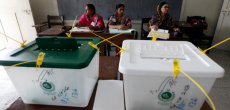[vc_row][vc_column][vc_column_text dp_text_size=”size-4″]Four days ahead of the general elections, the caretaker government in Balochistan has implemented a ban on public meetings and gatherings in Quetta, citing security threats. The decision was announced by Balochistan’s Caretaker Information Minister Jan Achakzai through a post on X, highlighting a “terror alert.” The minister expressed concerns about a potential female suicide bomber targeting Quetta and urged caution, recommending that political gatherings and electoral meetings be held indoors.
As the February 8 polls approach, Balochistan and Khyber-Pakhtunkhwa are witnessing a disturbing increase in violence, including acts of terrorism and threats against prominent political figures. The Balochistan government emphasized the priority of public safety, urging all political parties and candidates to prioritize security.
Read more: ECP Reviews Security Amid Increased Terror Incidents
Recent incidents in Balochistan include a fatal blast on Sabzal Road in Quetta and separate hand-grenade attacks in Jaffarabad and Turbat cities, resulting in casualties. The Election Commission of Pakistan (ECP) expressed deep concern over these attacks and requested a report from the Balochistan chief secretary and inspector general.
Additional instances of violence involved a hand grenade thrown at the office of PPP candidate Mir Nooruddin Nowsherwani in Kharan and another at the PML-N office on Qambrani Road, Quetta. The Counter Terrorism Department (CTD) reported threats to 15 political figures in Khyber-Pakhtunkhwa, leading to heightened security measures.
Meanwhile, a sit-in and protest in Khar Bazaar, Bajaur, persisted following the killing of National Assembly candidate Rehan Zeb. In Quetta, an attack on the PPP election office on Sariab Road injured five people, while a hand grenade was thrown at the residence of PPP candidate Mir Zahoor Buledi in district Kech.
The overall situation remains tense as election-related violence continues, presenting challenges for law enforcement agencies in maintaining peace and stability in the region. The caretaker government’s decision to ban public meetings in Quetta underscores the serious security concerns leading up to the elections, with a focus on safeguarding public welfare and minimizing potential risks associated with political gatherings.[/vc_column_text][/vc_column][/vc_row]











